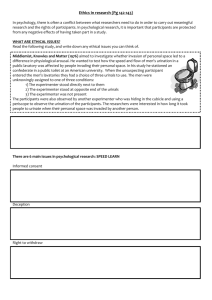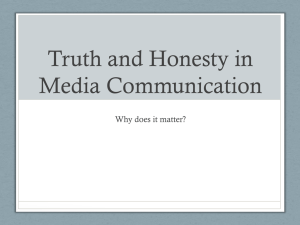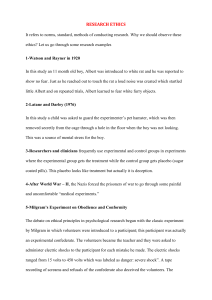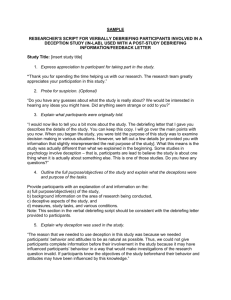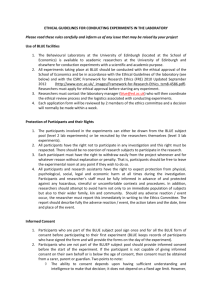Sample
advertisement
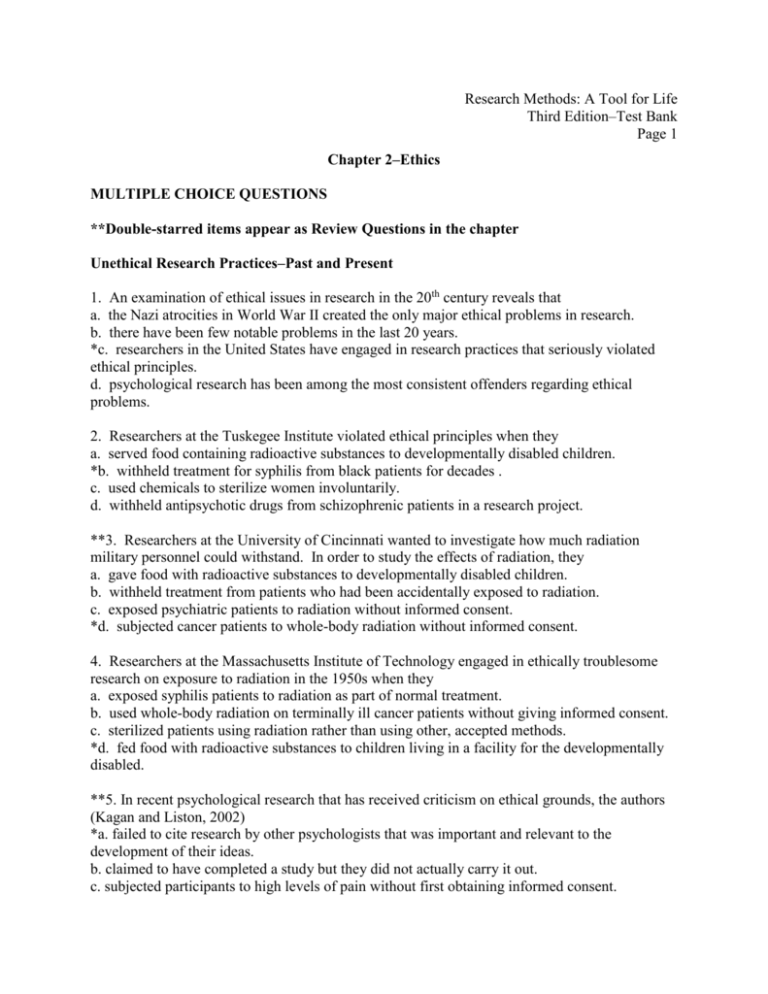
Research Methods: A Tool for Life Third Edition–Test Bank Page 1 Chapter 2–Ethics MULTIPLE CHOICE QUESTIONS **Double-starred items appear as Review Questions in the chapter Unethical Research Practices–Past and Present 1. An examination of ethical issues in research in the 20th century reveals that a. the Nazi atrocities in World War II created the only major ethical problems in research. b. there have been few notable problems in the last 20 years. *c. researchers in the United States have engaged in research practices that seriously violated ethical principles. d. psychological research has been among the most consistent offenders regarding ethical problems. 2. Researchers at the Tuskegee Institute violated ethical principles when they a. served food containing radioactive substances to developmentally disabled children. *b. withheld treatment for syphilis from black patients for decades . c. used chemicals to sterilize women involuntarily. d. withheld antipsychotic drugs from schizophrenic patients in a research project. **3. Researchers at the University of Cincinnati wanted to investigate how much radiation military personnel could withstand. In order to study the effects of radiation, they a. gave food with radioactive substances to developmentally disabled children. b. withheld treatment from patients who had been accidentally exposed to radiation. c. exposed psychiatric patients to radiation without informed consent. *d. subjected cancer patients to whole-body radiation without informed consent. 4. Researchers at the Massachusetts Institute of Technology engaged in ethically troublesome research on exposure to radiation in the 1950s when they a. exposed syphilis patients to radiation as part of normal treatment. b. used whole-body radiation on terminally ill cancer patients without giving informed consent. c. sterilized patients using radiation rather than using other, accepted methods. *d. fed food with radioactive substances to children living in a facility for the developmentally disabled. **5. In recent psychological research that has received criticism on ethical grounds, the authors (Kagan and Liston, 2002) *a. failed to cite research by other psychologists that was important and relevant to the development of their ideas. b. claimed to have completed a study but they did not actually carry it out. c. subjected participants to high levels of pain without first obtaining informed consent. Research Methods: A Tool for Life Third Edition–Test Bank Page 2 d. published a figure that originally came from the research of other psychologists that had appeared in a different journal 6. Psychological research that is ethically very troublesome *a. is fairly rare, with the most well-publicized examples having occurred several decades ago. b. was first identified a century ago and continues to this day on a frequent basis. c. involves falsifying or fabricating data in up to half of the research associated with competitive federal grants. d. led to the development of the Nuremburg Code that lists the rights of participants in research. **7. According to research by the U.S. Office of Research Integrity, the most frequently occurring ethical offenses involved a. departing from protocols for randomly assigning participants to groups. *b. falsifying or fabricating data. c. plagiarizing by claiming that another researcher’s data were the offender’s own data. d. completely fabricating (i.e., making up) details of studies that were never actually conducted. 8. According to research by the Office of Research Integrity on ethics in research, a. there is an extremely low level of ethical violations in research in the United States. b. the single largest category of violations is plagiarism of others’ work. *c. when researchers act unethically, it is most likely to involve either making up or falsifying data. d. almost every researcher knows of cases of ethical violations by others that go unreported. 9. One of the main problems associated with research with psychiatric populations is that a. they are so different from one another that it is ethically troublesome to put them in treatments that are standardized rather than individualized. *b. they may not be able to give truly informed consent because of their psychiatric problems. c. such research has to involve placebo groups for whom treatment is withheld. d. outside, pharmaceutical companies may provide funding. 10. Pharmaceutical companies have come under criticism on ethical grounds by researchers because the companies a. have made so much money researching and producing drugs for the very ill. b. have waited much too long to release drugs that would benefit people who have no other effective drugs. *c. have hired medical personnel to supervise drug research after those people had been accused of serious ethical violations in research and treating patients. d. regularly fail to receive informed consent by the patients they study. 11. Using the ideas of somebody else without attributing those ideas to that person is known as a. nonmaleficence. b. simulation. *c. plagiarism. Research Methods: A Tool for Life Third Edition–Test Bank Page 3 d. desensitization. 12. Researchers who publish the same information in two different works are engaging in a. active deception. b. passive deception. c. simulation. *d. self–plagiarism. 13. When an author cites well-known information in a manuscript with which most people are familiar, that author a. should cite the original source of the information in order to avoid plagiarism. b. is guilty of self-plagiarism if the original source is not cited. c. should cite the secondary source from which the information came. *d. does not need to cite a source to avoid plagiarism. 14. The psychologist Diederik Stapel engaged in violation of ethical standards when he a. plagiarized the work done by his students. *b. made up data that made it look as if he had conducted numerous research projects c. failed to obtain permission from his Institutional Review Board before collecting data on participants. d. failed to report colleagues that had fabricated data in several controversial studies. Ethical Guidelines Created by the American Psychological Association 15. The ethical principles developed by the American Psychological Association contain guidelines for achieving the highest ideals of psychology. These principles are called *a. aspirational goals. b. ethical standards. c. enforceable rules. d. principles of beneficence. **16. The enforceable rules of conduct associated with the ethical principles developed by the American Psychological Association are a. aspirational goals. b. principles of responsibility. *c. ethical standards. d. ethico-legal principles. 17. Which of the General Principles of the American Psychological Association relates to maximizing the positive outcomes and minimizing negative outcomes of work? a. fidelity and responsibility b. integrity c. respect for people’s rights and dignity *d. beneficence and nonmaleficence Research Methods: A Tool for Life Third Edition–Test Bank Page 4 18. If a psychologist has a conflict of interest either in research or in clinical practice when acting as a professional, the General Ethical Principle that relates to the psychologist’s activity is a. fidelity and responsibility. b. integrity. c. justice. *d. beneficence and nonmaleficence. 19. Which of the General Principles of the American Psychological Association relates to acting with professionalism in dealing with others? *a. fidelity and responsibility b. integrity c. beneficence and nonmaleficence d. respect for people’s rights and dignity **20. A psychologist who is providing therapy for a person should not develop a close friendship with the client because such dual relationships can compromise the success of the therapy. This problem relates to which General Ethical Principle of the American Psychological Association? a. beneficence and nonmaleficence b. respect for people’s rights and dignity c. justice *d. fidelity and responsibility 21. Which of the General Principles of the American Psychological Association relates to promoting one’s self and one’s work accurately? a. fidelity and responsibility *b. integrity c. beneficence and nonmaleficence d. justice 22. If a psychologist testified in a courtroom about research that he or she conducted, exaggerating the importance and validity level of the results would be in violation of which General Ethical Principle of the American Psychological Association? a. justice. b. respect for people’s rights c. fidelity and responsibility *d. integrity Research Methods: A Tool for Life Third Edition–Test Bank Page 5 23. Which of the General Principles of the American Psychological Association relates to recognizing our biases and the limitations to our expertise in psychology? a. fidelity and responsibility b. integrity *c. justice d. respect for people’s rights and dignity 24. If a psychologist uses a research or clinical technique without adequate training and expertise in that technique, he or she may be in violation of which of the General Ethical Principles of the American Psychological Association? a. fidelity and responsibility b. integrity c. beneficence and nonmaleficence *d. justice 25. Which of the General Ethical Principles of the American Psychological Association is involved if a psychologist violates the confidentiality of a research participant or clinical patient? a. integrity *b. respect for people’s rights and dignity c. beneficence and nonmaleficence d. justice **26 In resolving ethical situations involving legal issues and confidentiality, a psychologist a. can never reveal what a client has revealed in a therapeutic session. *b. may appropriately defer to legal authorities, even if involves violating confidentiality. c. is obligated to keep information confidential if revealing it would cause embarrassment. d. is allowed to reveal confidential information only when a client gives written permission. 27. One of the problems of engaging in professional behavior in an area beyond your domain of expertise is that *a. if you use a test on which you have not been trained to use and interpret, it may expose a client to risk. b. you may inadvertently exploit your position of knowledge to gain improper advantage over another person. c. you are not able to keep complete documentation and records appropriately. d. you are likely to violate confidentiality because you are not familiar with the details of interpreting your findings. Legal Requirements and Ethics in Research **28. The Nuremburg Code of ethics in human research arose because of a. the failure to provide medical treatment in the research on syphilis done at the Tuskegee Institute. Research Methods: A Tool for Life Third Edition–Test Bank Page 6 b. the addition of radioactive substances in children’s food at a home for the developmentally disabled. c. the obedience studies conducted by Milgram. *d. the Nazi research in the second world war. 29. Research with people is assessed to make sure it doesn’t violate ethical guidelines. The evaluation is performed by a. the American Psychological Association. b. the American Psychiatric Association. *c. an Institutional Review Board in the college or university where the research is done. d. the investigator’s research team. **30. Research may not require approval by an Institutional Review Board if *a. it occurs in a commonly accepted educational setting and assesses instructional strategies.. b. it involves only passive deception. c. a similar study has already been done elsewhere with no ethical problems. d. it involves studies of children. 31. Research may not require approval by an Institutional Review Board if a. participants can be identified for possible compensatory followup. *b. it involves observation of public behaviors. c. the participants are friends or acquaintances of the researcher. d. it involves people who voluntarily disclose illegal behaviors. **32. Research on how people respond to informed consent forms has revealed that *a. many Americans don’t read well enough to understand what they are reading on the informed consent forms. b. many people do not bother to read the informed consent forms because they trust the researchers. c. the informed consent forms often omit information important for people to understand the research d. people are often upset after learning what they will have to undergo if they participate in the research. 33. Research on the informed consent process has revealed that a. informed consent forms have become easier to understand after legal regulations were imposed. b. most people do not bother to read the forms; they just take them home and forget about them. *c. researchers who perceive Institutional Review Boards to be unjust often try to deceive the review board. d. the research process does not really benefit from giving participants the opportunity to review the nature of studies in which they participate. Research Methods: A Tool for Life Third Edition–Test Bank Page 7 34. Sieber (2009) reported that a group of student researchers was told by their Institutional Review Board that they needed to inform homeless participants that they did not have to answer questions if they were uncomfortable with the questions. The student researchers objected to this restriction because they believed that *a. the students thought that the homeless people would not take the research seriously because they wouldn’t answer any questions they didn’t want to anyway. b. the data from the research would not be valid if people did not have to answer the questions. c. other researchers had already asked similar questions without causing any problems with the participants. d. giving the homeless participants less information would let them complete the research in a fast, but sensitive, manner. The Importance of Social Context in Deciding on Ethics in Research **35. The criticism of Milgram’s obedience research by psychologist Diana Baumrind (1964) included the claim that the research a. did not include compensatory followup b. should have been preceded by an attempt to estimate how many participants would be willing to give high levels of shock c. did not include either dehoaxing or desensitization. *d. involved costs in terms of participant distress that were not outweighed by the benefits. 36. One result of Stanley Milgram’s obedience research was that a. he was cited as having violated ethical guidelines by the American Psychological Association. *b. his application to become a member of the American Psychological Association was delayed until the Association concluded that he had not violated ethical guidelines. c. his studies led to an immediate increase in similar obedience studies. d. he overturned the conclusions that previous researchers had made in their research on obedience. 37. The criticism of Milgram’s obedience research by psychologist Diana Baumrind (1964) included the claim that the research a. participants did not actually shock the learner, so the results are not valid. b. did not include either dehoaxing or desensitization. *c. would cause the participants not to trust authority figures in the future. d. would have considerable short-term negative effects, but minimal long-term effects. 38. Milgram defended the ethics of his research by noting that *a. he sought expert advice from psychiatrists on possible participant behaviors before he started the research. b. his participants delivered only mild shocks to the learner in the study. c. compensatory followup showed that at the end of the study, participants experienced negative effects but that the effects had disappear within two years. Research Methods: A Tool for Life Third Edition–Test Bank Page 8 d. the dependent attitude of the participants would protect them from any negative effects of taking part in the study. 39. Milgram’s obedience research was important at the time he conducted it because a. behavioral theories of the time predicted one outcome but Freudian theory predicted very different outcomes. *b. the Nazi atrocities of World War II that were based on blind obedience was still fresh in people’s memories. c. Milgram’s studies were among the first to study the effect of obedience on racist behaviors. d. earlier studies of obedience had erroneously predicted how people would behave under stressful conditions. **40. Milgram defended his research by pointing out that he a. did not intend to harm anybody and could not foresee the problems that occurred. *b. engaged both in debriefing and in dehoaxing of participants after the study ended. c. paid participants well enough to overcome any discomfort they had experienced. d. the research was so important that it was acceptable, even if a few people were harmed. What You Need to Do if Your Research Involves Deception **41. Studies about participants’ reactions to being deceived in research have revealed that a. most participants are offended when they learned that they have been lied to. b. deception leads participants to be skeptical or suspicious about psychological research. *c. participants regard the science and practice of psychology positively, even after learning that they have been deceived. d. they agree that ethical guidelines should prohibit deception in psychological research. 42. If you are conducting research and decide to withhold some information about the nature of the study, you are using a. a masked cover story. *b. passive deception. c. natural simulation. d. role playing. 43. If you are conducting research and decide to give a false cover story so a participant doesn’t know the true nature of the study, you are using a. technical deception. *b. active deception. c. passive deception. d. implicit deception. **44. When you decide to tell participants something false about a research session in order to mislead them, you are using Research Methods: A Tool for Life Third Edition–Test Bank Page 9 a. naturalistic observation. b. role playing. *c. active deception. d. dehoaxing. 45. Researchers use deception because a. they want to see how much participants are willing to believe before questioning the experimenter. b. it is often easier than using dehoaxing. c. they can develop logical cover stories. *d. deception induces participants to act naturally. 46. Researchers have found that when people are asked not to reveal the deception used in a study, *a. the participants usually comply with the request. b. the participants reveal the deception to friends more than half the time. c. the participants are actually more likely to reveal the deception than if no request is made. d. the participants often become skeptical of the research. 47. The final segment of a research session involves a. discussing the data with the research participant so the participants understand the reasons for doing the study *b. clearing up any deception used and eliminating potential sources of negative feelings among participants. c. making sure that participants have given informed consent. d. reviewing the basic points of the Nuremburg Code for the participants. **48. If you have deceived participants during the course of a study, you need to debrief them. When you tell them about the deception, you are engaging in *a. dehoaxing. b. desensitization. c. ethical standards. d. informed consent. 49. If participants might leave an experimental session feeling bad about their performance, you need to eliminate the potential sources of distress. This process is called a. dehoaxing. *b. desensitization. c. compensatory followup. d. informed consent. 50. The process of dehoaxing and desensitization is called a. informed consent. Research Methods: A Tool for Life Third Edition–Test Bank Page 10 *b. removal of the cover story. c. institutional review. d. compensatory followup. **51. When participants in Stanley Milgram’s obedience studies left the research session, they had been told that they had been deceived about the nature of the study. Because the participants might have experienced potentially serious distress after the study, Milgram arranged for visits with a psychiatrist. This process was called a. dehoaxing. b. desensitization. *c. compensatory followup. d. informed consent. 52. After Milgram’s sessions in his obedience studies, he introduced the confederate who was supposedly getting shocked. The confederate was very friendly, smiled, and told the participant that there were no hard feelings or ill effects. This part of the study would be referred to as a. informed consent. b. concern for welfare. c. dehoaxing. *d. desensitization. Ethical Issues in Special Circumstances 53. A significant consideration in cross-cultural research is that *a. research results about cultural groups can lead to stereotyping of people in those groups. b. too much knowledge about a different cultural group can result in loss of objectivity in interpreting research results. c. it is important to have a research from multiple cultural groups so members of the group being studied can check their conclusions with others. d. people in a given cultural group are often quite similar in most respects and this needs to be taken into account when researchers draw conclusions. 54. Dealing with issues of informed consent across cultures can be difficult because a. people in some cultures are not sophisticated enough to understand what informed consent means. *b. in some cultures, having people sign an informed consent form for a minor event like a simple research study is taken as a lack of trust on the part of the researcher. c. researchers from Western countries interpret informed consent in the context of the group, whereas people in other countries interpret it as an individual decision. d. the concept of informed consent does not translate very well in a number of languages. Research Methods: A Tool for Life Third Edition–Test Bank Page 11 55. One of the aspirational goals of the American Psychological Association’s ethical principles that relates to cultural research involves a. forming friendships with participants from other cultures in the research project. b. the increased risk of associated with deceiving participants from other cultures. *c. appreciation of differences in behaviors associated with factors like race, culture, and ethnicity. d. avoiding conclusions that might make it appear that people from other cultures show differences in behaviors and attitudes. 56. One of the ethical issues associated with internet research involves a. reaching a diverse set of participants. b. making sure that participants can leave a web site and return to it later to complete the study. c. the fact that different web browsers can display a given web page in very different ways. *d. making sure that data transmitted over the web are not intercepted in such a way that confidentiality and anonymity are violated. **57. If volunteers complete an internet-based survey on a sensitive and potentially distressing topic, one of the ethical considerations is hard to deal with is a. debriefing the participants after they complete their responses. *b. providing any necessary compensatory followup. c. reaching people who might not take distressing topics seriously. d. informing the participants that they can leave the study at any time. 58. An important issue in internet-based research is that *a. it is possible that participants do not understand the informed consent process, and the researcher is not there to help with the understanding. b. respondents who are completing questionnaires involving sensitive information are likely to feel anonymous. c. such research seldom involves ambiguity and when it does, a respondent can contact the research via email to get the ambiguity cleared up. d. because the research is not face to face, the researcher does not have to worry that a respondent is not of legal age to participate. 59. An advantage of internet-based research with respect to ethics is that a. it is easy to solve the problem with a participant does not understand the informed consent information. b. there are convenient ways to respond to questions during debriefing. c. if respondents feel compelled to complete the study once they start it, so the researcher gets a lot of useful data. *d. respondents feel a sense of anonymity and as a result may be less stressed about answering sensitive questions truthfully than in a face-to-face study. Research Methods: A Tool for Life Third Edition–Test Bank Page 12 **60. Some psychologists have criticized research with animals on ethical grounds. They have claimed that a. animal research cannot be used to understand or ultimately provide the basis for control of human behavior. b. psychological research with animals has doubled about every ten years. *c. keeping animals in captivity is unethical in and of itself. d. moral arguments are not a sufficient basis to justify ending animal research. 61. The use of animals in psychological research a. is accepted by few contemporary psychologists. b. has been on the rise for the past several years in psychology. *c. has decreased in psychology, with many psychology departments eliminating their animal facilities. d. is accepted by faculty but usually not by students. **62. When psychology students evaluate research with animals, students a. usually have very negative attitudes about the use of cats, dogs, and rats. *b. are very similar to their faculty mentors in their attitudes toward such research. c. support such research for their own studies, but not for the research of others. d. are very likely to agree that animals are necessary for their own research. 63. When two psychologists (Coile & Miller, 1984) studied the claims of animal rights activities about the torture of animals in psychological research, the psychologists discovered that a. there was little use of electric shocks, but consistent use of near starvation diets. b. psychologists often used high levels of painful stimuli to motivate animal behavior. c. there was a low level of smashing bones and amputations to study psychological responses. *d. over a five-year period, they could find no studies using intense electric shocks, or severe food or water deprivation. **64. If researchers provide negative, false feedback to participants, the performance of those participants may worsen. According to research, subsequent debriefing *a. leads to improved subsequent performance compared to participants who are not debriefed. b. often results in anger on the part of the deceived participants. c. makes no difference to the participants in subsequent behavior. d. leads to later frustration on the part of the participants. Controversy: Should Researchers Deceive Participants? **65. When participants complete a task for a purpose of which they are unaware, the researchers are using a. technical deception. *b. implicit deception. Research Methods: A Tool for Life Third Edition–Test Bank Page 13 c. role deception. d. naturalistic deception. 66. When researchers misrepresent the use of equipment in a study, they are using a. a cover story. b. simple deception. *c. technical deception. d. role deception. 67. When researchers misrepresent use of a confederate’s role in research and don’t inform participants, the researchers are using a. simple deception. b. technical deception. c. implicit deception. *d. role deception. **68. Participants are often uncomfortable when they learn that a research study has involved _____ deception. *a. role deception. b. passive deception. c. implicit deception. d. active deception. 69. Fisher (2005) suggested that we need to consider deception in several different ways. She said that considerations of deception should involve a. telling people in advance that they would be deceived. *b. making sure that people have enough information, even with deception, to make an informed decision about participating. c. debriefing people after a study but not telling them about deception because it usually leads to frustration and anger n the part of the person being deceived. d. removing both active and passive deception when researchers plan their experiments. INTEGRATION OF THE CONCEPTS Create two groups of items and explain why the terms in each group belong together. Research Methods: A Tool for Life Third Edition–Test Bank Page 14 Active Implicit Role Passive Technical Debriefing Dehoaxing Desensitization Compensatory Followup Research Methods: A Tool for Life Third Edition–Test Bank Page 15 Group 1: Types of deception–Active, Passive, Implicit, Role, Technical Group 2: Post-experiment communication–Debriefing, Dehoaxing, Desensitization, Compensatory Followup ESSAY ITEMS Short Answer Items (*Starred items appear as study questions in the textbook.) Unethical Research Practices–Past and Present *1. Identify and describe two examples of unethical biomedical research that has taken place in the United States. Suggested points: a. the Tuskegee syphilis study that left men untreated even after effective treatments had been developed b. University of Cincinnati researchers exposed terminally ill cancer patients to whole body radiation in research designed to learn how military personnel exposed to radiation might be affected c. researchers at MIT, Harvard Medical School, Massachusetts General Hospital, and Boston University School of Medicine administered radioactive substances to retarded children without informing either the parents or the children d. researchers at the Duke Medical Center failed to study adequately the risks associated with simulations of behaviors at 30,000 feet and failed to provide the participant with appropriate informed consent e. physicians recruited patients for participation in research of diseases of the prostate gland; the physicians were paid by a corporation for recruiting some participants who did not have prostate disease. 2. Why is informed consent such a difficult issue in psychiatric research? Suggested points: Psychiatric patients may not be in appropriate condition to understand the nature of the research they are going to participate in, so they can’t meaningfully give informed consent. In addition, their legal guardians may not be able to make the best decision on behalf of the patient. Ethical Guidelines Created by the American Psychological Association 3. What is the difference between the aspirational goals and the ethical standards in research developed by the American Psychological Association? Suggested points: The aspirational goals are statements designed to guide psychologists toward the highest ethical levels in their professional work. The ethical standards are enforceable rules on ethics that, when violated, can lead to penalties for the person violating the standards. Research Methods: A Tool for Life Third Edition–Test Bank Page 16 *4. Identify the six general principles regarding ethical conduct and what behaviors they pertain to. Competence Engaging in professional work for which one has adequate training and knowledge Integrity Refraining from engaging in inappropriate relationships with clients, colleagues, and research participants Professional and Scientific Responsibility Upholding ethical principles in one’s own behavior and working to maximize it in colleagues Respect for People’s Rights and Dignity Treating people with respect, obeying laws and regulations, maintaining anonymity and confidentiality when appropriate. Concern for Others’ Welfare Acting in ways that minimize the possibility of physical or psychological harm to others Social Responsibility Using psychological knowledge for the benefit of people and animals 5. What are the eight categories of enforceable rules defined in the American Psychological Association’s ethical standards? Suggested points: a. general standards b. evaluation, assessment, or intervention c. advertising and other public statements d. therapy e. privacy and confidentiality f. teaching, training supervision, research, and publishing g. forensic activities h. resolving ethical issues Ethical Standards as They Affect You 6. Why are the ethical principles associated with “Boundaries of Competence” relevant to students conducting their own research? Why are the students’ professors also affected? Suggested points: Students should engage in research for which they are adequately trained; if lack of training increases the risk of physical or psychological harm to participants, students should not act as researchers. This point is relevant to the students research advisor because the advisor is ultimately responsible for the behavior of the student. Research Methods: A Tool for Life Third Edition–Test Bank Page 17 *7. What points to researchers need to consider if they intend to use deception in their research? Suggested points: Deception is tolerable only if there is no feasible alternative and if it will not expose the participant to physical or psychological harm, including embarrassment or other discomfort. If deception is necessary, the researcher must debrief and dehoax the participant. In the end, the researcher must make sure that the participant is not negatively affected at the conclusion of the research setting. If there is any doubt, compensatory followup is required. Legal Requirements and Ethics in Research 8. Briefly describe why the world felt that the Nuremburg Code was necessary after World War II. Suggested points: During the war, the Nazis engaged in atrocious research, forcing people to participate, ignoring all considerations of respect and dignity. After the war, countries sought to pass rules that would provide for the safety of future research participants. 9. Describe how different points in the Nuremburg Code relate the degree of potential risk associated with the value of the results of an experiment. Suggested points: The Nuremburg Code stipulates that research must contribute to existing knowledge (Point 2); further, no research should be conducted if it will not produce results that are useful within a discipline (Point 3). If experimenters notice that a participant is at risk, they must terminate the research immediately (Point 10). Given that research has merit, any risks associated with it must be less than the potential gain from doing the study (Point 6). *10. What types of research can be exempt from Institutional Review Board (IRB) consideration, according to U.S. federal law? Suggested points: Research conducted in established or commonly accepted educational settings, involving normal educational practices can be exempt from approval, such as the effects of different instructional strategies. Research involving the use of educational tests, survey procedures, interview procedures or observation of public behavior. (Surveys and interviews on sensitive or controversial topics may require IRB approval, though.) In addition, research involving public officials or political candidates can be exempt from IRB approval. Research involving the collection or study of existing, publicly available data, documents, records, pathological specimens, or diagnostic specimens is exempt if the personal identity of those providing the data is protected. The Importance of Social Context in Deciding on Ethics in Research Research Methods: A Tool for Life Third Edition–Test Bank Page 18 11. What criticisms did Diana Baumrind make of Stanley Milgram’s obedience research? How did Milgram respond to them? Suggested points: Baumrind claimed that the participants were unduly influenced by the experimenter, an authority figure, that they were really not volunteers; there was too much coercion. She also maintained that Milgram did not consider the long-term well being of the participants who experienced considerable distress. She also speculated that the participants would not trust authority figures after having been deceived so. She also claimed that the experimental participation could affect participants’ self-image. Finally, she stated that she thought the debriefing and dehoaxing process would not have relieved the stress. Milgram countered that he had gone to great lengths in advance to generate valid predictions about how participants would respond and was acting in good faith to protect their well-being; he also arranged for psychiatric followup to ensure that participants’ welfare was protected. *12. In terms of social context, discuss why Milgram’s obedience research might have been approved by an IRB when he did the research, but the IRB might be much less likely to approve it now. Suggested points: Milgram’s research occurred not long after World War II, when people were still astonished that the Nazis could act as they did, with blind obedience. In addition, the scare of communism caused many people to believe that communism in America would make people blindly obedient. Thus, the question of obedience was a critical social issue. Currently, we are less worried about the question of blind obedience in modern society. This issue has been replaced by other issues. Thus the cost of doing Milgram’s research (distress experienced by participants, etc.) would not be offset by the benefits (increased knowledge). Thus, a current IRB might consider studies of obedience not to be sufficiently pressing to warrant stressing participants the way Milgram did. CONTROVERSY: Should Researchers Deceive Participants? 13. What are implicit deception, technical deception, and role deception? According to research, how do participants feel about them? Suggested points: Implicit deception involves keeping participants unaware of the actual reason for the task they are engaging in. Technical deception relates to misrepresentation as to how equipment is being used. Role deception pertains to false statements about the role of other presumed participants in a study. According to research by Fisher and Fyrberg, most participants (about 90 percent) felt that implicit deception was not a problem. More participants were bothered by technical and role deception, but the majority (70 percent) still thought that deception was not troublesome. Research Methods: A Tool for Life Third Edition–Test Bank Page 19 What You Need to Do If Your Research Involves Deception *14. What arguments do opponents of deception in research raise in their criticisms of deception? Suggested points: a. deception is immoral b. when participants are deceived, they do not know the nature of the study, so they cannot give truly informed consent c. people will become suspicious or develop negative attitudes toward psychology 15. In research involving deception, why do researchers engage in dehoaxing and desensitization? Suggested points: Dehoaxing involves telling participants how they were deceived and why it was necessary; further, they learn the purpose of the study. Desensitization pertains to eliminating any possible negative feelings by the participants so they leave in a positive state of mind. 16. Sometimes researchers do not debrief participants immediately; instead, the debriefing takes place after the experiment is entirely complete. What are the advantages and disadvantages of this approach? Suggested points: Delayed debriefing means that participants will not be able to discuss the study with other participants who would then not be naive; these subsequent participants could alter their behavior in light of what they know. A disadvantage of delayed debriefing is that any negative effects of participation may persist, increasing the risk of physical or psychological harm. In addition, some participants may never learn of deception or of the purpose of a study because they fail to return for debriefing or do not pay attention to information sent by the researcher. 17. Are participants likely to disclose important elements of research projects to others? Suggested points: Research has produced mixed results regarding the likelihood that participants will inform others of the research. Some research suggests that participants will talk about the study to others, but other research suggests that, if the experimenter requests people not to talk to others about the research, those participants respect the experimenter’s request. Ethics Issues in Special Circumstances *18. What ethical issues arise in considering participants’ rights when they engage in research on the internet? Suggested points: Research Methods: A Tool for Life Third Edition–Test Bank Page 20 a. confidentiality and anonymity–there must be a guarantee that nobody but the researchers will be able to see the data (confidentiality) or to find out who participated (confidentiality). Security on the internet isn’t guaranteed b. informed consent–although a person could stop filling out a survey at any time, there is no guarantee that a person will feel that he or she can stop c. debriefing–internet research may make debriefing information available, but participants may not make use of it d. compensatory followup–if there are any negative effects of participation, the researcher may never know. e. theft of ideas or plagiarism–unscrupulous researchers may steal others’ ideas and claim them for their own; because of the public nature of the internet, the issues could become cloudy 19. How do psychologists, psychology students, and the general public typically regard the use of animals in research? Suggested points: According to Plous (1996a, b) a sizeable majority of psychologists (over 85%) consider research with animals acceptable when it involves naturalistic observation. A smaller majority (over 60%) thinks research with confined, laboratory animals is appropriate. A third or less think that research involving pain or death is worthwhile. Undergraduate psychology students are highly similar to their professors. Among the general public, there is a high level of support for research involving some animals (i.e., rats) but not for others (i.e., dogs). *20. When people oppose the use of animal research, what arguments do they produce? Suggested points: Some people argue from a practical standpoint, saying that we don’t learn very much about people from studying animals, so keeping animals confined to laboratories reduces the quality of the animals’ lives and doesn’t produce useful research results. Other people argue from a moral standpoint, maintaining that we don’t have the right to keep animals captive or to treat them inhumanely. 21. What counterarguments do proponents of animal research make in justifying their work? Suggested points: Coile and Miller (1984) considered published research to investigate the claims of opponents to animal research and found that the claims of exposure to intense pain, starvation, and mutilation were not valid and were essentially nonexistent in psychological research. In addition, Coile and Miller pointed out that experimental animals have produced useful treatments for such maladies as cancer and AIDS, and have helped us understand some aspects of the development of depression.

